Sarcoidosis Europe
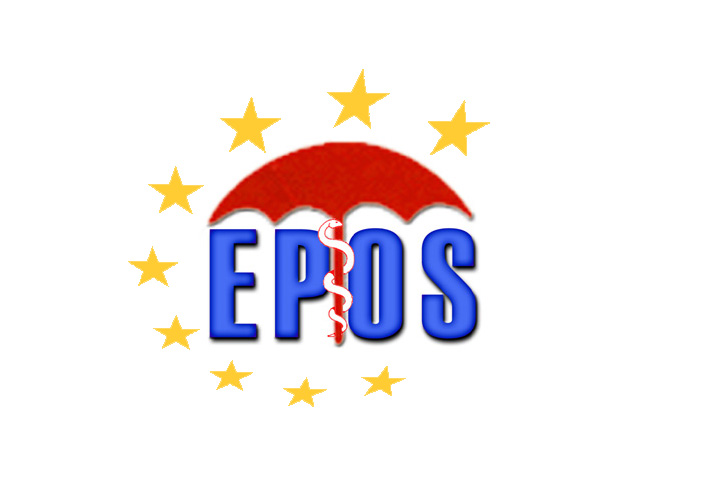
European Association of Patients Organizations of Sarcoidosis and other Granulomatous Disorders (EPOS)

Sarcoidosis Reference Network
in the European Reference Networks for Rare Diseases (ERN)If you are looking for sarcoidosis experts or second opinion in critical case, please read!
In this great European initiative for rare diseases Sarcoidosis was associated due to itís largest organ involvement of the lung
with the European Reference Network for rare lung diseases (ERN-LUNG) and especially to the core network of interstitial lung diseases (ILD)
due to the medical systematic.
More over in this European Network approach the interdisciplinary cooperation within each ERN and with the other ERNís is in the central scope of this initiative.
This is of course in accordance of the general character of the Sarcoidosis disease
which can affect nearly all organs and therefore reflects the needs of Sarcoidosis patients.
The vision and key objectives of this initiative is to improve the care and treatment of people living with a rare disease in Europe,
to build a network of experts to collect and enhance medical knowledge and to increase research.
The 'Sarcoidosis Europe' with national sarcoidosis patients' associations and along with many ambrella organisations on other rare disorders in Europe
is engaged for several years now to foster a network of expert centers in Europe collaborating for the benefit for Sarcoidosis patients,
especially severely affected patients. This is a model for interdisciplinary and cross-border collaboration in health care.
So we are very happy, that the start with lotís of small and large steps was done successfully.
Since the beginning of this initiative we are supporting it as member of the European Patient Advisory Group (EPAG) of ERN-LUNG.
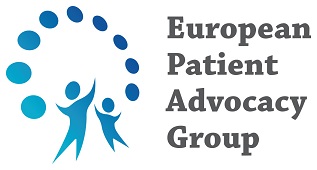
In Europe these are currently 28 university and special hospitals in several European countries.
The medical ERN members have access to a special European case conference software with up to date patient data security and data protection
(Clinical Patient Management System CPMS) allowing also cross-border expert advise.
A lot of the European Sarcoidosis experts are well known to several of the national Sarcoidosis patientsí associations or are even member
of their medical advisory boards.
We therefore are very thankful to the experts in Europe making available their expertise to the patients and their local doctors
to bring together experience in this rare disease and connecting to actual Sarcoidosis research for the severely affected Sarcoidosis patients.
Position the mouse on the European map on the country of interest and click left to see the ILD reference centers with the links
to their information websites and contact details in this country if any.
Credits: Many thanks to
Phil Archer
for sharing this very instructive svg example.
Belgium
![]()
France
![]()
Italy
![]()
Czech
![]()
Germany
![]()
Netherlands
![]()
Denmark
![]()
Great Britain
![]()
Spain
![]()
ERN-LUNG
is a non-profit, international, professional, patient-centric and scientific network and it is committed Europe-wide and globally to the prevention,
diagnosis and treatment of rare respiratory diseases through patient care and advocacy, education and research.
In keeping with these goals, ERN-LUNG will interact with both national and international organisations which have similar goals.
ERN-LUNGís vision is to be a European knowledge hub for rare respiratory diseases and to decrease morbidity and mortality from them in people of all ages.
Please read more about the
European reference networks
and watch the
Video
on the website of the European Commission (EC).
Sarcoidosis Expert Advice
The European Reference Network for Rare Lung Diseaes (ERN-LUNG) is the only one uptodate to provide this general expert service to patients and their care given doctors.
Please ask your question to the
ERN-LUNG Expert Advice Knowledgebase.
This service is available in English and German right now. Please use.
It is important to know, that we will not be able to make a personal diagnosis or give you a personal treatment recommendation online.
For such please refer to the
ERN-Lung reference centers
to achieve personal diagnotics and treatment as well as to recieve bross-border referal to experts for your local health care provider/doctors.
ERS Academy of Sarcoidosis
The European Respiratory Society (ERS) is pleased to share that registration is now open for the ERS Academy of Sarcoidosis on June 4-5, 2024 in Milan/Italy for all different medical professions. Registration deadline for early bird fees is April 8, 2024.
This course will allow different medical specialists to share their knowledge about sarcoidosis and give the attendees an excellent opportunity to ask medical experts organ-specific questions regarding sarcoidosis.
The course will follow a varied format, consisting of lectures, interactive workshops, case-based sessions and question and answer discussions, in which participants will cover:
Thank you very much for your interest and wishing you full success for the practical implementation of new insights for the benifit of all sarcoidosis patients!
FSR webinar and call for Advancing Clinical Trial Equity for Sarcoidosis and other conditions
The Foundation for Sarcoidosis Research (FSR) in the US joined the ACTe NOW! Phase Roadmap 2 Progress initiative -
please join also to promote for more diversity in clinical trial design in order to better serve the needs of our worldwide Sarcoidosis patients' community.
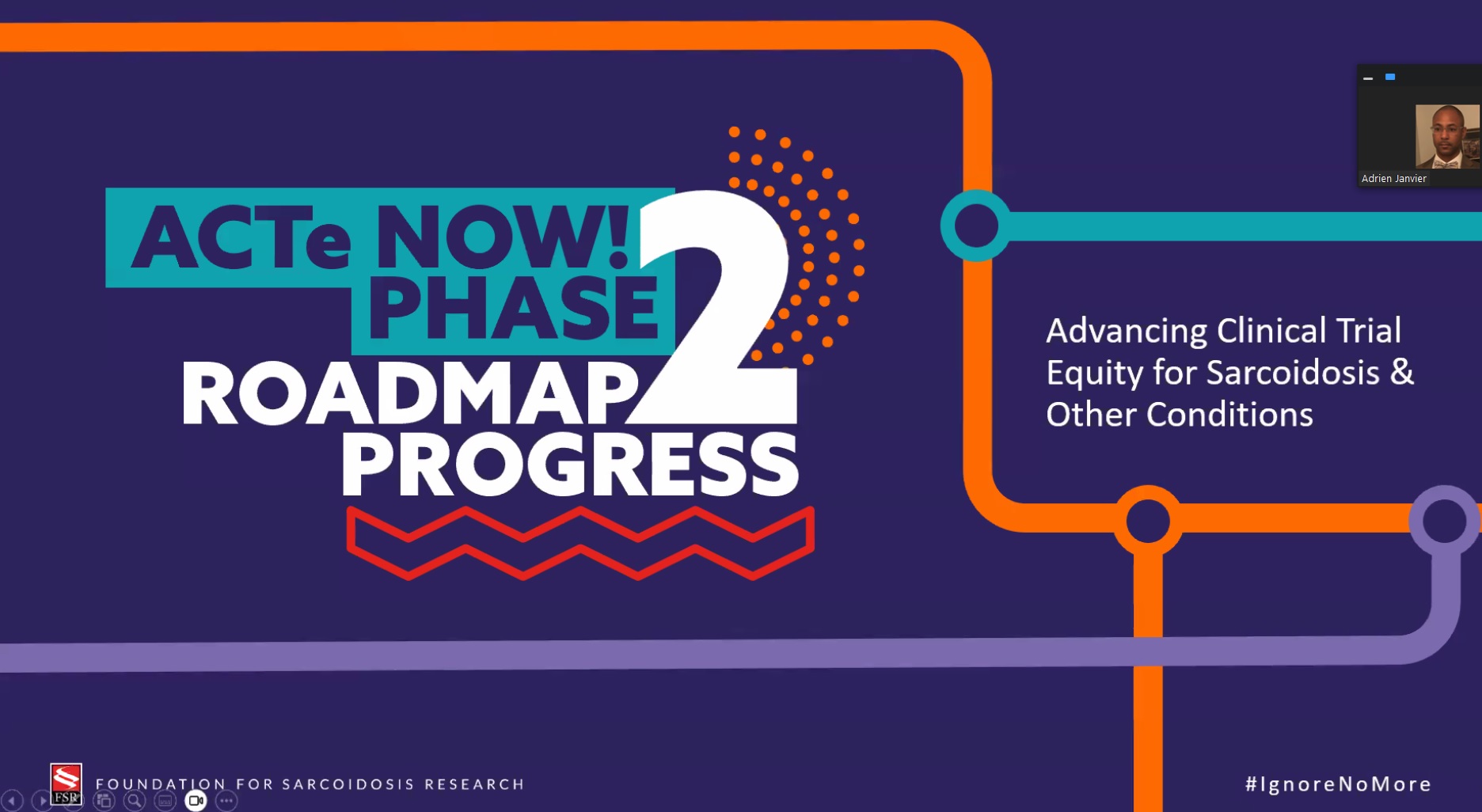
ERS statement on transition of care in childhood interstitial lung diseases
Interstitial lung diseases (ILD) are a heterogeneous group of rare diffuse diseases affecting the lung parenchyma in children and adults.
Childhood interstitial lung diseases (chILD) are often diagnosed at very young age, affect the developing lung, and can have different presentations and prognosis compared to adult forms of these diseases.
Also, chILD in many cases may apparently remit, and have a better response to therapy and better prognosis than adult ILD.
Many affected children will reach adulthood with minimal activity or clinical remission of the disease.
They need continuing care and follow-up from childhood to adulthood if the disease persists and progresses over time but also if they are asymptomatic and in full remission.
Therefore, for every chILD patient an active transition process from paediatric to adult care should be guaranteed.
This ERS statement provides a review of the literature and current practice concerning transition of care in chILD.
Please refer to the
ERS statement
for more details.
Sarcoidosis patient treatment priorities - survey results
As a joint action with Sarcoidosis researchers from US and Europe and support of the European Lung Foundation (ELF)
the sarcoidosis patient organisations in Europe collaborated and promoted this first survey on
treatment priorities of sarcoidosis patients.
The response to this questionaire within 1,5 month being online was really large: 1.842 participated.
Thanks very much to all of those.
The detailed results are just officially published in the European Respiratory Journal Open Research in the linked article
'Sarcoidosis: patient treatment priorities'
(ERJ Open Research 2018 4: 00141-2018; DOI: 10.1183/23120541.00141-2018).
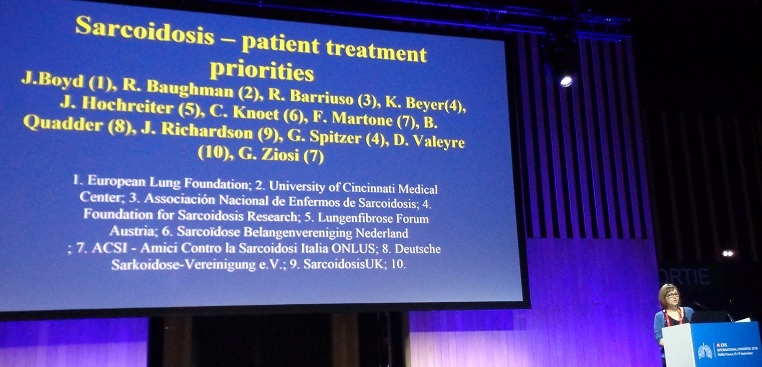
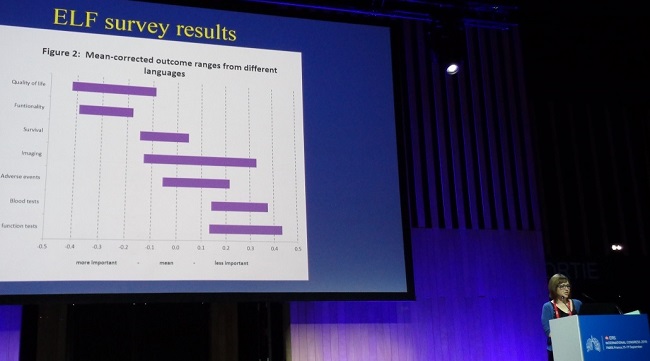
"Scans, tests and examinations are of course crucial in the treatment, but the well-being and the quality of life determine
how much I suffer from sarcoidosis. And that is the most important thing."
"Our survey also highlighted that assessing ability to work and provision of supportive measures in this area were additional important factors for consideration.
The survey results reinforce the view that clinical indicators should not be the only target of treatment and that sarcoidosis clinicians should be encouraged
to assess patient-reported aspects so that they can be incorporated into care."
"Clinicians should work in a multidisciplinary way. This is particularly important for multisystem diseases to ensure that specialists can contribute their expertise at the same time to enable quicker, accurate and comprehensive diagnosis, treatment and follow-up."
"Access to a range of services, such as pain management and psychological support, is important to achieve."
"Sarcoidosis specialists and specialist centres are needed in every country."
New medical guideline on treatment of Sarcoidosis
The European Respiratory Society (ERS) had developed and published a new medical guideline on treatment of Sarcoidosis by European and American Sarcoidosis doctors and researches
firstly with the involvement of patient organisations and patient representatives from Europe and the USA.
Since the 1999 Statement on Sarcoidosis this is now the neccessary update taking into account the medical and scientific developments over the last more than 20 years compiling the uptodate evidence and experts' experiences
in treating different mayor and critical organ involvements as well as treating general symptoms of Sarcoidosis as a multi-systemic disease.
Please find the full ERS guideline text
ERS guideline text
and the
patient friendly summary
in lay language performed and provided by the European Lung Foundation (ELF) in different languages.
Thank you so very much to all medical experts and active patient representatives for their voluntary work all over and of course for the scientific and organisational support of ERS and ELF!
Sarcoidosis Online Seminars
Recordings of the worldwide first sarcoidosis online seminars for patients and carers on the new guideline for treatment of sarcoidosis patients in several languages are now published.
For all who missed these online seminars live we are very happy that the recordings could be published now on the internet.
Medical sarcoidosis experts and researchers from Europe and the US being members of the international guideline working group from various countries
first explain the new European guideline on treatment of sarcoidosis patients before they are answering many questions of us - sarcoidosis patients from around the world.
By the way this is also the worldwide first treatment guideline on sarcoidosis with active involvement and cooperation of sarcoidosis patient associations
and sarcoidosis patient advocates from Europe and the US.
Please use this single and unique option to inform yourself on first medical expert level about the actual evidenced based information
on uptodate world research and knowledge on treatment of your sarcoidosis disease.
We are very thankful to our European cooperation partner ELF (European Lung Foundation)
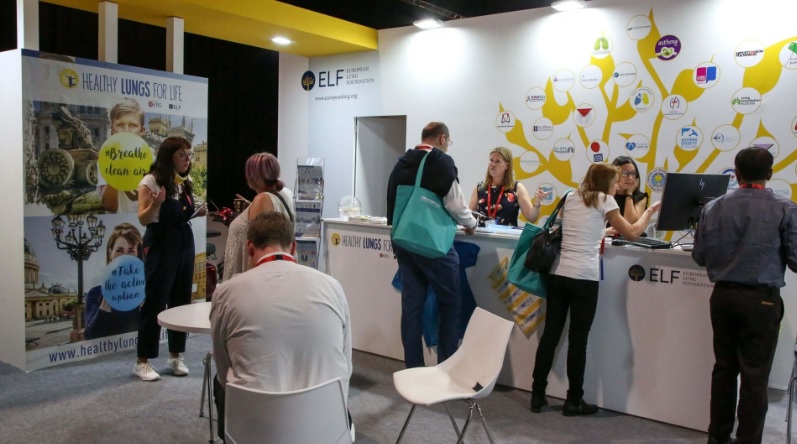
and of course to our member and parent and sister organisations of sarcoidosis patient associations in different countries
and patient advocates in Europe and the US for there continuous and trustful engagement and support of our common vision.
Please find the recordings of these worldwide first sarcoidosis online seminars for patients with medical experts concerning the new treatment guideline on the
website of ELF on sarcoidosis
(https://europeanlunginfo.org/sarcoidosis/library/)
in English, French, Italian and Spanish, as well as the comprehensive version in Chinese, Danish, Dutch and Serbian.
Besides organ specific treatment options you will find also such for general sarcoidosis symptoms like fatique and dysponea in the new guideline
and also addressing the needs for further and new research areas for sarcoidosis.
Like before we will inform all about upcoming research projects with the possibility to join and support as sarcoidosis patients.
Therefore thank you so very much for your permanent interest as sarcoidosis patients and carers to go for and support new base research and clinical studies
in our disease with so many open questions and unmet needs.
Let's go on together - there is no other lobby for our common patients' interests than our solidarity community!
Sarcoidosis Patient Compass
This is a new service of European patients' associations for all Sarcoidosis patients!
This is an interactive tool to help guide you through your sarcoidosis journey.
It will help you understand which questions to ask your doctor.
The importance of each point will be determined by the type of your sarcoidosis, and your understanding of your condition.
Read and be aware of all the points but consider carefully only those points which are important for you at this current time.
You are encouraged to use the tick boxes and to refer back to the compass over time.
Please follow this link to the
Sarcoidosis Compass in 6 languages
EN,
DE,
ES,
FR,
IT,
NL.
Please
feedback
your user experience to help us improve this tool. Thank's!
Sarcoidosis Patient Journey
The way to the right diagnosis is not always straight and easy.
Like in many rare diseases the differential diagnosis is a complicated journey for patients and their doctors
with pitfalls of possible misdiagnosis or even mistreatment as the picture below illustrates.
With our European ambrella organisation for rare disorders EURORDIS we supported the underlying study.
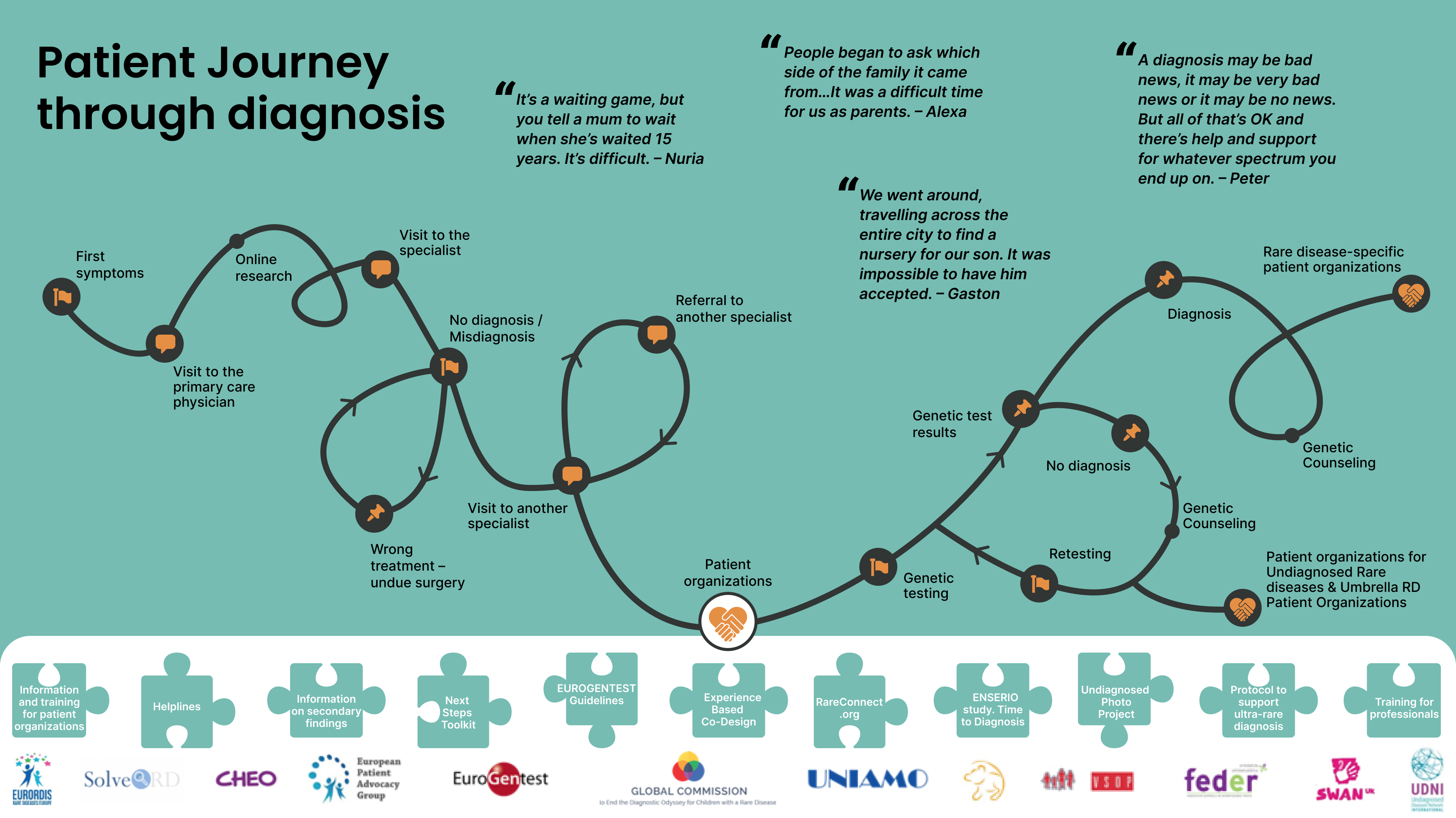
Please find here the
Sarcoidosis Patient Journey*
which was developed by European Sarcoidosis PatientsĎ Organisations and patient advocates
within the framework of the Sarcoidosis Patient Priorities Project of the European Lung Foundation (ELF) based on an template
of EURORDIS for the European Reference Networks for Rare Diseases (ERN).
It represents the views of the patient community while the 6 European patient associations incorporated representing over 7,000 Sarcoidosis patients in Europe.
It outlines not ony the clinical presentation and patient needs at each of the stages of the patient journey,
but reflects also recommendations of what 'good care' and support would look like in the view of the patient community.
Sarcoidosis Patient Charter
The ELF Sarcoidosis Patient Advisory Group (SPAG) outlines their joint strategy for the future improvement of patient care and quality of life for people with sarcoidosis.
Their hope is that the charterís Call for Action will raise awareness and widen understanding about the impact that this condition has on many people in Europe and worldwide.
The SPAG calls on patients, caregivers, healthcare professionals, policy makers and the general public to support the
Sarcoidosis patient charter
and to help disseminate it as widely as possible.
Research surveys: What is your experience with Sarcoidosis and COVID-19?
Please support these surveys on the effect of COVID-19 pandemic - both on specific effect on Sarcoidosis patients -
as well as on more general aspects of rare disease patients and those with a chronic condition - all of them Sarcoidosis patients may have to face also!
Interaction of Sarcoidosis and Covid-19 virus
Sarcoidosis researchers need your help.
We are trying to determine:
- How frequently sarcoidosis patients are infected with COVID-19 (corona virus).
- If a sarcoidosis patient is infected with COVID-19, what happens to them.
- Does having sarcoidosis or being on treatment make one more likely to have problems with COVID-19?
If you are interested in helping us learn the answer to this question, we ask you to complete the questionaire in English found at
COVID-19 survey in sarcoidosis patients.
Please find
here preliminary results
of the first 1,600 responders as well as an interview with the principal investigator Prof. Dr. Baughman, MD.
The survey is ongoing. Please help and take your active part in this
sarcoidosis survey.
Effect of the Covid-19 pandemy on rare diesease patients
The next survey with our European ambrella organisation EURORDIS is essential for the rare disease community including us as Sarcoidosis patients.
It will enable us to measure how the virus is affecting rare disease patientsí lives and give us the possibility to communicate facts and figures to decision-makers, so that people living with a rare disease are not left behind when handling the crisis.
The survey should take no more than 15 minutes to complete.
All responses are anonymous and will be kept in secure storage only accessible to the Rare Barometer research team.
Through asking questions such as how the COVID-19 pandemic is affecting patientsí care, social care, employment situation, and mental-health,
we will be able to better understand this unprecedented situation.
This survey is open to people living with a rare disease and their family members from any country in the world.
It is translated in 23 languages. Please look at the
preliminary results*
of the first 5,000 responders.
If you like, have a quick look at the results of a
former survey*
showing the serious impact on everyday life of rare disease patients, their families and carers.
Thank you very much for your participation in all of these research projects to make the impact and burdon of our disease visible!
Recommendations: How to protect people living with a rare disease in the COVID-19 pandemic as confinement measures are being lifted
The COVID-19 pandemic has had an unprecedented impact on people and health systems.
EURORDIS-Rare Diseases Europe already brought to urgent attention the needs of the 30 million people living with a rare disease in Europe
as one of the most vulnerable populations during the crisis.
The recent EURORDIS COVID-19 survey shows that the pandemic heavily impacted the rare disease population.
More than two months later, confinement measures are slowly being lifted in many countries.
As the virus still circulates and as measures are constantly changing,
it is crucial that COVID-19 post-confinement responses and policies in every country, region or locality
prioritise the specific needs of vulnerable populations, including people living with a rare disease.
The risk for an exacerbation of pre-existing inequalities is very real and will translate into worse health outcomes for all,
not just the most vulnerable. It is crucial to act now to limit collateral damage.
Please read the common
position paper*
on how to protect people living with a rare disease in the COVID-19 pandemic as confinement measures are being lifted.
Research: Big Sarcoidosis Survey
We want a better understanding of who is affected by sarcoidosis, how they are affected, the possible causes and how they are being treated by healthcare professionals in order to identify the issues for future research from the patients' perspective. Please contribute to the Big Sarcoidosis Survey of our member association SarcoidosisUK. Thank's a lot for support of future research priorities.
Goto top of pageSarcoidosis Factsheet
The European Lung Foundation (ELF) with the Sarcoidosis Patients' Priorities Project has created a new sarcoidosis fact sheet on symptoms, diagnosis, treatment and support. Please follow this link to the Sarcoidosis Online Factsheets in 8 European languages and the Sarcoidosis Download Factsheets in 12 languages BG*, DE*, EL*, EN*, ES*, IT*, NL*, PL*, PT*, RU*, SR*, TR*.
Goto top of pageEuropean rare disease community calls for more ambitious health programme in the face of budget cuts
Have we already forgotten the lessons learnt from COVID-19?
With our European ambrella organisation for rare diseases EURORDIS we support the following statement
calling on the European Commission, the negotiators of the European Parliament, and the German Presidency of the European Council
to take action to reverse the European Councilís drastic reduction of funding to the EU4Health programme.
We strongly supported the European Commissionís proposal for the ambitious EUR 9.4 billion standalone EU4Health Programme,
which aligns with the want of 70 % of European citizens to see more health-related actions at the European level.
In light of the current COVID-19 pandemic, it also showed a willingness to learn from the mistakes of the past and was a great step towards
avoiding replicating them in the future. EURORDIS and EPOS finds the European Councilís recent decision to reduce the budget to EUR 1.7 billion
coming from the Multiannual Financial Framework (MFF) regrettable. It has a decisive impact on what can be achieved within this new framework.
Please follow this link to the
press release*.
A new pilgrimage for sarcoidosis: walking for quality of life
Ange van Ommen is a sarcoidosis patient who, after several years of severe illness, walked from her home in the Netherlands to Santiago de Compostela (Spain) in 2012.
Severe illness requires you to rediscover who you are, within the limitations of the disease, a homecoming to the self as it where.
This has inspired Ange to walk home from Santiago de Compostela this year. She will start the 2.600 kilometres long walk in Santiago de Compostela on April 13th and hopes to arrive home mid-August.
Raising money for charity.
Ange is grateful to have found the tools, including her pilgrimages, that have allowed her sarcoidosis to become a stabilized chronic illness and given her a new lease on life.
With this pilgrimage, she'd like to give back to the sarcoidosis community by raising money for research into the quality of life with sarcoidosis
through the Dutch sarcoidosis patient organisation: Sarcoidose.nl.
If you'd like to support Ange, you can donate
here
(https://sarcoidose.digicollect.nl/ange-van-ommen).
Meeting fellow sarcoidosis patients along the way.
Ange would love to stay with fellow sarcoidosis patients on her pilgrimage.
If you live along the route and would like to host her, please email to
ange@sarcoidose.nl.
In France and Belgium, she'll pass through: Bayonne, Peyrehorade, Dax, Bordeaux, Saintes, Tours, Poitiers, Beaugency, Paris, St. Quentin, Maubeuge, Nivelles, Bruxelles, Mechelen, Antwerpen, Wuustwezel, and Meer.
Thank you very much for your donation and your personal support along her European pilgrimage for Sarcoidosis!
Sarcoidosis survey on side effects of steroids
As an successfull immuno-regulating or immune system suppressing therapy in Sarcoidosis like e.g. steriods save live, can have side effects as well.
Some of the possible side effects are temporarily and may vanish during or after therapy, some maybe minimised by e.g. co-medication, physical rehabiliation or specific change of nutrition or adjusting psycho-social support,
others may persist or worsen especially in long-term and mid to high dosage of medication needed - often depending on the affected organs and the severity of disease or when suffering also from other diseases (so-called co-morbidity).
We - the Sarcoidosis patients' community worldwide - lack of detailed investigation of the possible long-term side effects of all existing therapeutic options.
Therefore we are very happy that very well experienced medical Sarcoidosis experts and researchers took our patients' concerns to develop a new international survey to bring light on this reality in our daily life
and ask for our treatment experiences in short-term as well as in long-term therapy.
Please take this world-wide first chance and provide your experiences as Sarcoidosis patient concerning your course of disease, treatment and side effects in order to learn more about our needs
and to encourage development of new treatments and future processes to identify and prevent harmful effects of steroids.
This international survey in fully anonymous and conducted by the Sarcoidosis Center of the Cleveland Clinic in Cleveland, Ohio, USA.
If your are a Sarcoidosis patient and interested to support this medical scientific survey, please follow this
link
(https://redcap.ccf.org/redcap/surveys/?s=MPRNJK9H7CDFK4AA) for further information and to take the survey which would take about 10 minutes.
Thank you very much in advance for your help to enlighten our patient reality concerning steriod side effects and to learn more about this unmet need for improvement of this treatment option for us all!
First europe wide survey on the burden of your disease in daily life at home, in school and education, at work and in private life
A lot of our co-sufferers of rare disorders like e.g. Sarcoidosis experience major burden in their dialy life and also despite treatment and despite disease improvements, they face the effect of their Sarcoidosis day by day -
most invisible due to general symptoms like total fatique and exhausement and chronic pain.
How are you or your family members participating in social activities, such as school, leisure and work? What does living independently mean to you? What would you need to participate in society to your full potential?
Worldwide all rare disease patients and their relativews can take part in this survey.
Please join us also in your language!
(https://www.sphinxonline.com/surveyserver/s/EURORDIS75/SPIL_interface/questionnaire.htm)
This survey is available in 25 languages and will take around 20 minutes to complete. It will help us as a non-profit alliance of patient organisations to work towards and advocate for people with rare diseases like Sarcoidosis
to access their rights and participate in society on an equal basis with others. This survey is available until September 8th, 2024 only.
The more people take this survey, the stronger will be our common voice!
You will receive the global survey results, which we will share with decision-makers. Your answers will be kept in secure storage, which only the research team can access, all due to the European General Data Protection Regulation.
If you like you may watch the
online event recording
launching this new Rare Barometer survey on Social Participation and Independent Living exploring the impact of rare diseases on everyday life.
Thank you very much in advance for your participation in this survey and your support in order to enlight these aspects of the disease burden in our dialy life and put a real spotlight of this uptonow often invisible unmet need for us as Sarcoidosis patients worldwide!
Campaign for access to care for people with rare diseases
Have you experienced difficulties in accessing a treatment for your condition, including medicines, medical devices, surgeries, or medical consultations?
The EURORDIS Access Campaign Questionnaire is inviting anybody living with a rare disease who has experienced difficulties accessing treatment to respond to our brief online Questionnaire by Monday 30 October, 2023.
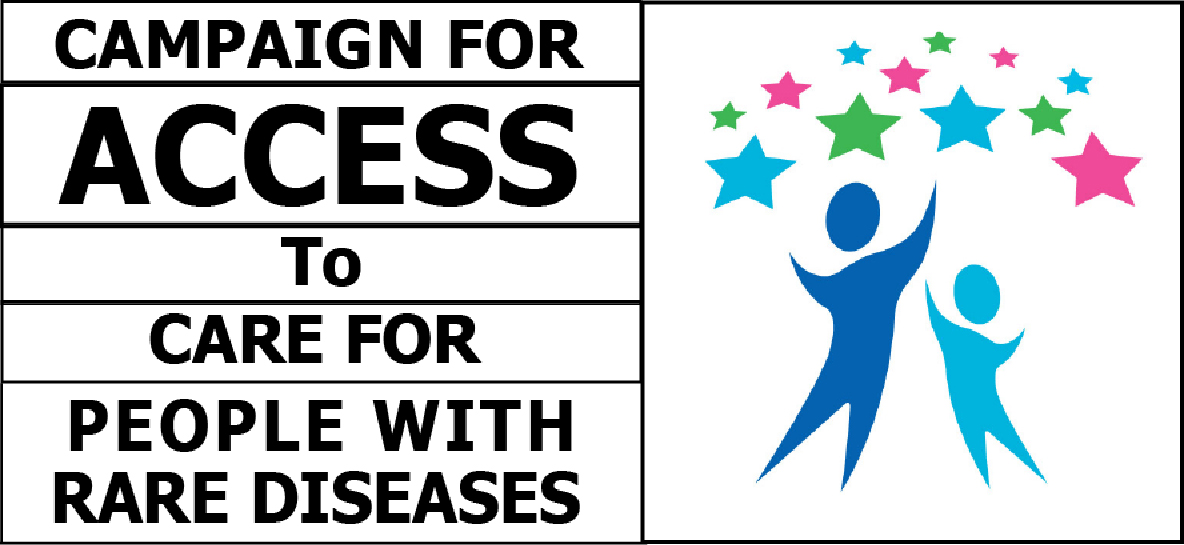
Results of our Questionnaire are analysed by trained EURORDIS staff and communicated to national and European-level Health Authorities, in order to facilitate solutions addressing access problems
and will also informs a report on treatment access for the European Commission, of which the next one will be submitted in early 2024.
Please take this short
survey
(http://www.surveymonkey.com/s/H2SM3P9) on your patients' experiences concerning access to treatment for your rare disease.
Thank you very much in advance for your help to put a spotlight on this critical topic of care for us all!
Key developments in pulmonary fibrosis research
In the third session of a new series of monthly and free webinars for the pulmonary fibrosis community
Prof. Dr. med. Michael Kreuter, Mainz/Germany, Dr. med. Pilar Rivera-Ortega, Manchester/UK, and Dr. med. Maria Molina Molina, Barcelona/Spain,
discussed key developments in pulmonary fibrosis research and highlights from the 2023 European Pneumology Congress that took place in Milan/Italy in September 2023.
The session was moderated by Steve Jones, EU-PFF President.
This online session maybe interesting for all sarcoidosis patients suffering from its fibrosing subtype, so-called Sarcoidosis type IV.
The recording is now available on the
web page
(https://www.eu-pff.org/eu-pff-summit-webinars/).
Thank's to our colleagues of the European Federation for pulmonary fibrosing diseases for their constantly ongoing support.
Europe-wide survey on treatment adherence in patients suffering from pulmonary fibrosis
Since very few recent years only new treatment options for so-called idiopathic lung fibrosis is available at all,
and even more recently - new treatment for other fibrosing interstitial lung diseases like e.g. Sarcoidosis type IV, is available for our doctors and us patients in Europe.
But of course these new medicines against this progressive and life threatening subtype of different diseases have possible side-effects which patients have to cope with.
How is their experience concerning access to new treatment options in Europe, what are their experiences with treatment and co-treatment to minimize these side-effects,
how are their real-world-experiences as patients to follow the medicine intake instructions in daily life and
which improvements would help them to achieve optimal benefit from these new treatment options.
In order to find out we would like to ask you, when you are a Sarcoidosis patient suffering from the fibrosing subtype of Sarcoidosis (so-called Sarcoidosis type IV),
to take a few minutes and share your patient experiences - fully anynomized due to the European General Declaration of Personal Data Protection.
The online survey is performed by our long-term cooperation partner the European Pulmonary Fibrosis Federation as the European ambrella organization
for patient organizations for fibrosing lung diseases.
It's scientifically evaluated and available in EN, FR, DE, GR, IT, PL, RO and ES.
Of course we know that these new treatment options may be helpful and relevant for at best and at least about 10 % of us Sarcoidosis patients only,
but in now more than 140 years of medical scientific history of our disease this could be the third major breakthrough in it's history of treatment options.
After corticosteroids got available to civilians after World War II in Europe the letal rate of us dropped down from somewhere above 30 percent to about less than 10 percent of us,
just decreasing the inflammatory progression before getting fibrotic.
For all patients which Sarcoidosis don't respond to corticosteroids or other immunosuppressive agents the development and availability of TNF-alpha-Antagonist medicine (Biologicals) could help them to decrease or stop inflammatory progression.
New anti-fibrotic treatment options may give our co-sufferers with the progressive fibrosing type of Sarcoidosis some more - maybe essential - years on the waiting list to lung transplant.
Since in 1993 Sarcoidosis hit me, I met about 15 co-sufferers in person in Germany with this fibrosing subtype,
passed away under immunosuppressive medication, because there was no anti-fibrotic drug available anywhere on earth, and I miss them.
It was not only a teacher in Munich, a nurse in Berlin, our former Sarcoidosis support group leaders in Munich, Hannover and Dortmund
or former board members of our association from Berlin or Dortmund but also famous actresses
like Margot Trooger in Germany, Bernie Mack in the US or writer and dramatugist Thomas Bernard in Austria.
So we really know what we are fighting against!
The letal lung involvement of Sarcoidosis is only one of the five top letal risk organ involvements of Sarcoidosis we are fighting!
Please help us and we're much awaiting the results of this survey.
Who we are
EPOS
was founded as the european umbrella under which the national patients' organizations
will be represented. Founded on October 23th, 2000
by Sarcoidose.nl (Netherlands) formerly SBN,
DSV (Germany),
SarcoidosisUK (United Kingdom) formerly SILA, and
SSARV (Switzerland).
EPOS was joind by BBS (Belgium) in autumn 2006
and by ISARC (Ireland) in spring 2008.
Since then collaboration with affiliated Sarcoidosis patient associations developed with
the succeeding association in Ireland
Sarcoidosis Ireland (Ireland),
Amici Contro la Sarcoidosi Italia onlus (Italy),
ANES (Spain),
Serbian Association of Sarcoidosis (Serbia),
NAS (Bulgaria),
Association Coeur Couleur La SarcoÔdose (France) and
UOS (Croatia).
EPOS has clearly marked targets and ideals.
These include active participation
in the foundation of (new) national organizations and also to stimulate
international research and provide a forum for the exchange of ideas,
experiences and expertise. The priority remains the provision of adequate information
for patients and all others involved, in the broadest sense.
The suffering of the long-term sarcoid patient must be recognized as an unsatisfactory situation. Not only is the cause unknown but a medical cure remains undiscovered. In order to help these patients and those who aim to help them, the European Association of Patients Organizations and other Granulomatous Disorders (EPOS) was brought into being.
On the next pages, the members will present the general thoughts and issues in greater detail and, more importantly, in their languages.
For questions and/or suggestions Sarcoidosis Europe (EPOS) can be reached by mail:
Sarcoidosis Europe
P.O. Box 30 43
D - 40650 Meerbusch
Germany Phone:
+49 (0) 21 59 - 815 30 - 25 Fax:
+49 (0) 21 59 - 815 30 - 26 Email:
info@sarcoidosis.biz
European Association of Patients Organizations of Sarcoidosis and other Granulomatous Disorders (EPOS)
Office-Address:



